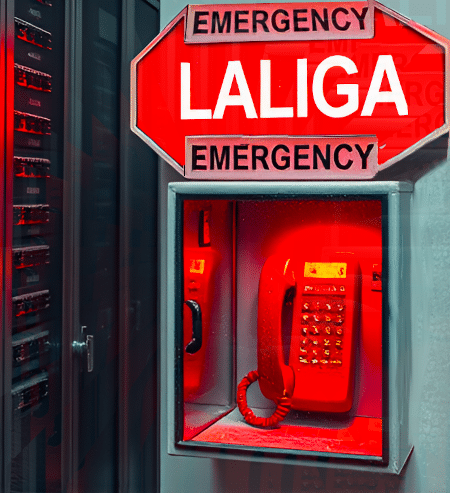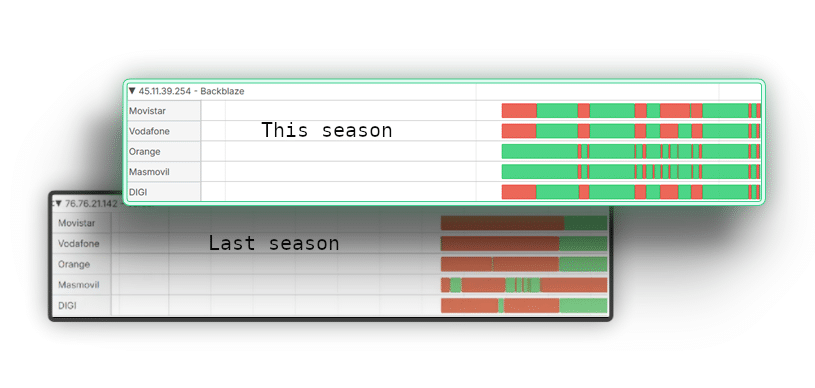 LaLiga’s escalation of its anti-piracy enforcement measures began back in February with unprecedented blocking of Cloudflare IP addresses used by pirate sites, affecting large numbers of innocent websites using them too.
LaLiga’s escalation of its anti-piracy enforcement measures began back in February with unprecedented blocking of Cloudflare IP addresses used by pirate sites, affecting large numbers of innocent websites using them too.
After a brief pause between seasons, blocking returned in August. There was no shortage of complaints during the previous season, but momentum appears to be shifting, in part due to more people making themselves heard.
A growing number of public complaints from website owners, online businesses, regular users, even fellow broadcasters, all claim that LaLiga’s blocking measures are disrupting their online lives.
More Blocking, More Awareness, or New Options?
The reasons why people seem to be more vocal now is hard to pinpoint. It’s possible that blocking is impacting more innocent sites than it did previously. Perhaps the owners of affected websites are discovering the cause of their mystery technical problems thanks to greater information available online. It’s feasible that people are starting to feel a little more emboldened.
For the past few months LaLiga has waved overblocking claims aside as unreliable and overblown. From pirates in disguise with an axe to grind, to random malicious groups with nothing better to do, complaints have been dismissed as mere allegations unsupported by credible evidence. That might be about to change.
Supported By Credible Evidence
The appearance of hayahora.futbol, an automated platform that logs instances of blocking, and more recently Immutable Domain Monitor, a platform promising to store evidence on the blockchain, have the potential to tip the balance of power.
With its 24/7 reporting on live blocking events, Hayahora.futbol is effectively building a database of IP addresses blocked by the country’s major ISPs, accurate to a couple of minutes. The majority of blocking affects Cloudflare so if the moment required it, Cloudflare’s records could be called upon to validate Hayahora’s records.
For those interested, Laliga-IP-List on GitHub uses Hayahora.futbol data to update a growing list of blocked IP addresses likely to have resulted in collateral damage.
A New Approach: Intermittent Blocking
Whether the existence of Hayahora.futbol played a part in the decision isn’t clear, but since the start of the new season new blocking tactics have taken shape.
While previously blocking was often continuous, the general theme now is intermittent blocking. In the image below, three ISPs are following one pattern and the two remaining ISPs are following another.

There are various theories why this might be beneficial from an anti-piracy perspective. Providing the ISPs don’t object (there’s nothing in the court order that mandates blocking gymnastics), introducing controlled chaos into the equation has the potential to frustrate some pirate viewers. Relaxing and then immediately not relaxing in front of the big game doesn’t sound like much fun.
On a more cynical level, when compared to accessing a legal website ordinarily blacked out for several continuous hours (or days), intermittent blocking might make it more difficult to attribute the lack of connectivity to a single culprit. In a scenario where blocking isn’t uniform across all ISPs, more tricky still. No longer can any site claim blocking started at 4pm and ended at 11pm, or that any business was completely wiped out.
Reports of New Fines For Users
A report in El Pais says that LaLiga has taken “an unprecedented step” in its war on piracy.
“In recent weeks, numerous individuals have received certified letters demanding payment of around €450 to avoid future legal action for consuming illegal football broadcasts. The measure, presented as a necessary step in defending the audiovisual rights of clubs, has generated intense legal and social debate as it targets end users for the first time,” the report begins.
“According to notifications received by many users, LaLiga claims to have identified IP addresses from which illegal broadcasts have been accessed. Based on this data, it is demanding compensation payments to avoid litigation. The operation, however, arouses suspicion.”
Omar Benbouazza, director of communications for the RootedCON Cybersecurity Conference, cast doubt on the legality of pursuing end users.
“In Spain, the law only penalizes the distributor of the pirated signal, not the consumer, and operators who provide data without a court order are engaging in illegal practices,” he warns.
Potential Controversy: ISP Disclosure
Javier Prenafeta, lawyer and partner at 451.legal, informs El Pais that the controversy lies in how the IP addresses were obtained. He says that claims against end users rely on rulings that authorize traffic surveillance measures, but do not expressly legitimize the mass sending of certified letters to users.
“Many claims have been directed against these end users, so the legality of such evidence and the bad faith of these actions should be questioned,” he says.
The El Pais report concludes by considering potential risk to LaLiga’s reputation, noting that piracy can be fought not only in the courts but also in the public perception. Regardless of the overall bullish tone and approach, LaLiga will likely have its finger on every possible data point to predict where the line is and if, on balance, it should be crossed or not.
In every country to date, the metaphorical line would’ve been drawn before Cloudflare faced blocking in February. Having come this far, where it is now is anyone’s guess.
From: TF, for the latest news on copyright battles, piracy and more.
Powered by WPeMatico
